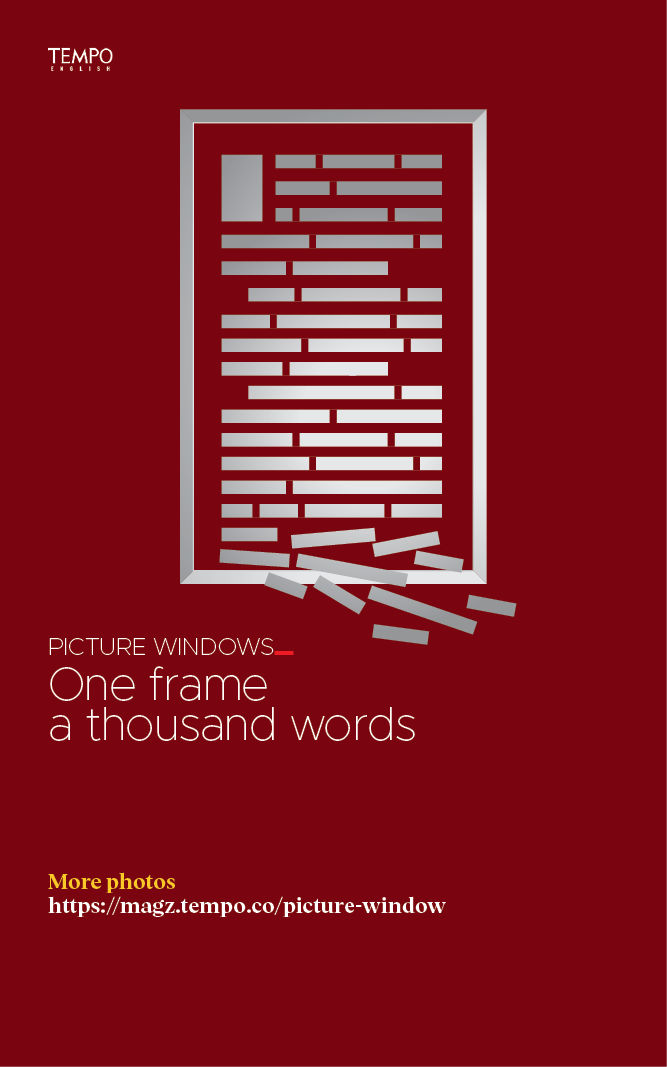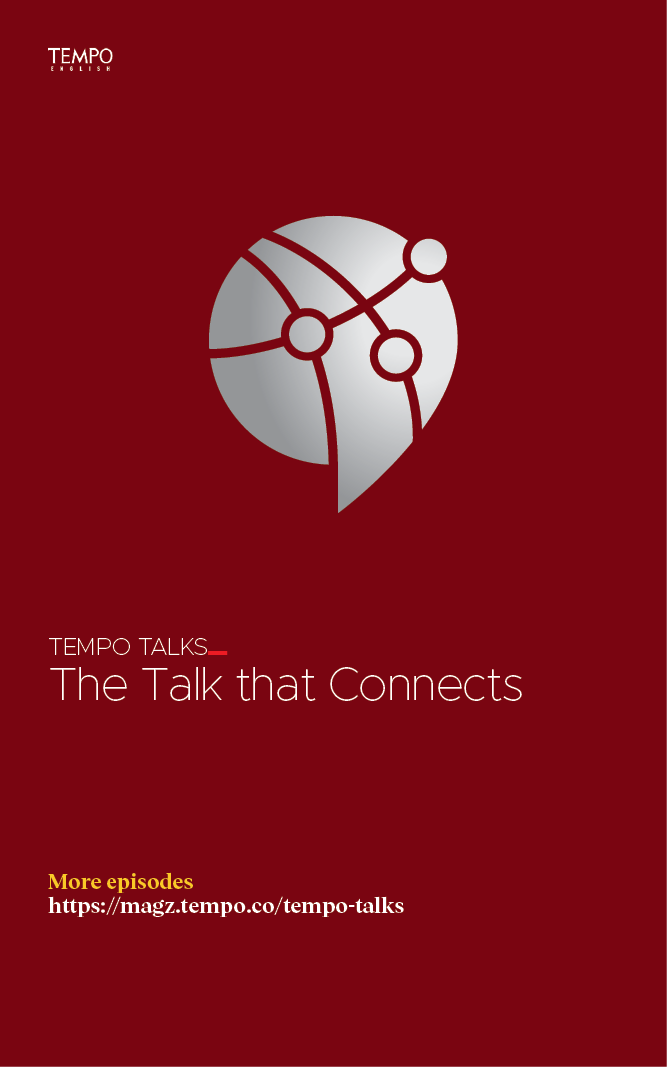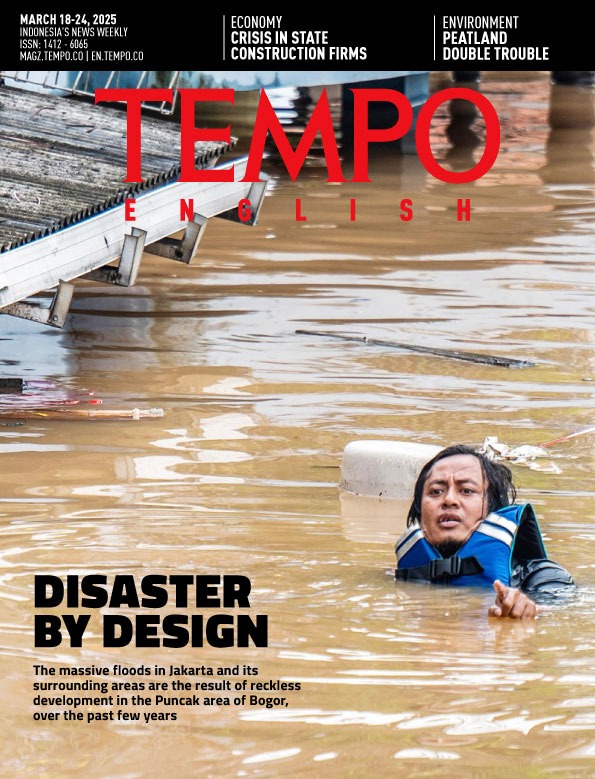December 23, 2014 edition
Kaleidoscope
The past 12 months has been a year of change. We have a new government led by a president who comes from the grassroots, with no ties to previous regimes. A clean break from the past. His cabinet includes nine women, the largest number ever to hold ministerial positions, one of whom is the nations first top diplomat. Jakarta has a new governor, the first ethnic Chinese elected to such a position in the history of Indonesia. A new beginning.
Read More
More Articles
Cartoon
Cartoon
Indicator
Democrats' Finger to the Wind
Letter From
2014 Headline Performances
Indicator
THE heated debate on political party alignments has reignited. The new round of speculation began when Democrat Party Chairman Susilo Bambang Yudhoyono met President Joko Widodo at the Presidential Palace on Monday two weeks ago. The stated purpose of the meeting was to discuss the Global Green Growth Institute (GGGI) summit set to take place in Bali in July 2015. Yudhoyono became chief of the GGGI after seeing out his term as Indonesia's president in October.
Read More
Cover Story
Read More
More Articles
Interview
How do you see the state of the nation?
Let me start with an overview of the macro political development. The process of electing a president, the smooth transition, given that we introduced democracy just 15 years ago, has been unbelievable. That such a country like Indonesia with over 250 million people, an archipelago not a land mass, with such a diverse background and ethnicity, can actually do it. This is the result of patience, and maybe compromises in order to achieve this peaceful process. That's how I see things in general with regards to the development of the country as a whole.
Has there been progress in bureaucratic reform?
We need to be concerned about the progress (or lack) of good governance. I worry about the level of corruption in the regions and what is happening in the DPR (House of Representatives), where there is no shame about not just committing but defending corruption. Having said that, we are still in a state of transition which tends to enable transactional politics. Is it the political system that leads to corruption or the other way around? But the effect is on bureaucratic reform.
Read More
More Articles
Travel
I remember clambering alone over the empty ruins of Panataran, East Java's largest and most imposing complex of Hindu ruins, when it was completely surrounded by ricefields in the early 1980s, in the days before Indonesian's mass adoption of the motorcycle. I had to take a clippity-clop dokar horse-cart for the 10-minute ride out into the countryside, seeking shade from the heat in the quiet corridors of friezes.
Read More
Word Watch
Environment
Law
The summons came as a surprise to Meidyatama Suryodiningrat, editor-in-chief of English-language daily The Jakarta Post. He had just presided over a meeting when he received the letter with the insignia of the Jakarta Police on Tuesday two weeks ago. The letter told him to meet up with a police investigator and stated that he was suspected of a crime. "How could this be?" Meidyatama remembers thinking at the time.
Read More
National
The two days of incessant rain in Banjarnegara, Central Java, finally stopped on Friday afternoon two weeks ago. Sinem, 55, seized the opportunity to pluck some taro leaves in the yard of her house in Jemblung hamlet, home to about 300 residents. She planned to cook a favorite dish of her husband, Suhaedi, 58.
The rain had prevented many people from leaving their homes. The freezing air at the foot of Mount Tlagalele pierced the bones. Before becoming a cassava and corn farm in between the albasia plants and the shrubs, the hill's slopes had been a community forest. Tlagalele is located on the right side of the residential areas through which the Karangkoba-Dieng highway cuts.
Read More
Asean & Beyond
Column
Emanuel Bria
Senior Associate - Asia Pacific, Natural Resources Governance Institute (NRGI)
Like in most countries of Southeast Asia, state institutions in Indonesia are historically weak, argued Frank Timpton (2008). Growing nationalism through stronger state direction does not correspond well with the state capacity for strategy making, policy formulation and administrative capacity to execute. In the same line of argument, Michael Ross (2004) is also puzzled with these questions: why does the Indonesian government mismanage so badly their natural resources? Why have the governments of many developing states done the same? And why do states generally squander their natural resources? In fact, resource boom damage state institutions through a rent-seeking economy.
Read More
More Articles
Opinion
AS the year comes to an end, the rupiah has gone into free-fall. Last Tuesday, the rupiah reached Rp12,900 to US$1, the lowest level since 2008. Bank Indonesia seemed incapable of reining in the plunge, triggered by the fall in the world price of oil and expectations of the US Federal Reserve rise in interest rates next year.
Read More
More Articles
Outreach
After 14 years in which it was left in disrepair, the Uma Mbakulu customary house in Praingu Lewa Paku village was reconstructed. Umbu Mbora, the raja of Lewa Kambera and the leader of Praingu Lewa Paku, a village on the island of Sumba in East Nusa Tenggara, had at last got back his throne. "It is in this place that I should live," he told Tempo two weeks ago.
Read More
Economy
More Articles
Tempo Talks
Improving Connectivity, Boosting Cooperation
This year, Indonesia and India mark 75 years of diplomatic relations. However, the ties between the two nations have existed much longer, predating the establishment of the Republic of Indonesia and the Republic of India. These connections span social, cultural, religious, economic, and trade aspects. But do those close ties of the past have any bearing on the present relationship? Why is there no direct flight between the capitals of the two countries?
Indian Ambassador to Indonesia and Timor-Leste, Sandeep Chakravorty, shares his views on this matter at TEMPO TALKS.
Read More
Other Editions Of The Magazine
-
-
-
-
-
-
Independent journalism needs public support. By subscribing to Tempo, you will contribute to our ongoing efforts to produce accurate, in-depth and reliable information. We believe that you and everyone else can make all the right decisions if you receive correct and complete information. For this reason, since its establishment on March 6, 1971, Tempo has been and will always be committed to hard-hitting investigative journalism. For the public and the Republic.
Interview
How do you see the state of the nation?
Let me start with an overview of the macro political development. The process of electing a president, the smooth transition, given that we introduced democracy just 15 years ago, has been unbelievable. That such a country like Indonesia with over 250 million people, an archipelago not a land mass, with such a diverse background and ethnicity, can actually do it. This is the result of patience, and maybe compromises in order to achieve this peaceful process. That's how I see things in general with regards to the development of the country as a whole.
Has there been progress in bureaucratic reform?
We need to be concerned about the progress (or lack) of good governance. I worry about the level of corruption in the regions and what is happening in the DPR (House of Representatives), where there is no shame about not just committing but defending corruption. Having said that, we are still in a state of transition which tends to enable transactional politics. Is it the political system that leads to corruption or the other way around? But the effect is on bureaucratic reform.
Read More
More Articles
Travel
I remember clambering alone over the empty ruins of Panataran, East Java's largest and most imposing complex of Hindu ruins, when it was completely surrounded by ricefields in the early 1980s, in the days before Indonesian's mass adoption of the motorcycle. I had to take a clippity-clop dokar horse-cart for the 10-minute ride out into the countryside, seeking shade from the heat in the quiet corridors of friezes.
Read More
Word Watch
Environment
Law
The summons came as a surprise to Meidyatama Suryodiningrat, editor-in-chief of English-language daily The Jakarta Post. He had just presided over a meeting when he received the letter with the insignia of the Jakarta Police on Tuesday two weeks ago. The letter told him to meet up with a police investigator and stated that he was suspected of a crime. "How could this be?" Meidyatama remembers thinking at the time.
Read More
National
The two days of incessant rain in Banjarnegara, Central Java, finally stopped on Friday afternoon two weeks ago. Sinem, 55, seized the opportunity to pluck some taro leaves in the yard of her house in Jemblung hamlet, home to about 300 residents. She planned to cook a favorite dish of her husband, Suhaedi, 58.
The rain had prevented many people from leaving their homes. The freezing air at the foot of Mount Tlagalele pierced the bones. Before becoming a cassava and corn farm in between the albasia plants and the shrubs, the hill's slopes had been a community forest. Tlagalele is located on the right side of the residential areas through which the Karangkoba-Dieng highway cuts.
Read More
Asean & Beyond
Column
Emanuel Bria
Senior Associate - Asia Pacific, Natural Resources Governance Institute (NRGI)
Like in most countries of Southeast Asia, state institutions in Indonesia are historically weak, argued Frank Timpton (2008). Growing nationalism through stronger state direction does not correspond well with the state capacity for strategy making, policy formulation and administrative capacity to execute. In the same line of argument, Michael Ross (2004) is also puzzled with these questions: why does the Indonesian government mismanage so badly their natural resources? Why have the governments of many developing states done the same? And why do states generally squander their natural resources? In fact, resource boom damage state institutions through a rent-seeking economy.
Senior Associate - Asia Pacific, Natural Resources Governance Institute (NRGI)
Read More
More Articles
Opinion
AS the year comes to an end, the rupiah has gone into free-fall. Last Tuesday, the rupiah reached Rp12,900 to US$1, the lowest level since 2008. Bank Indonesia seemed incapable of reining in the plunge, triggered by the fall in the world price of oil and expectations of the US Federal Reserve rise in interest rates next year.
Read More
More Articles
Outreach
After 14 years in which it was left in disrepair, the Uma Mbakulu customary house in Praingu Lewa Paku village was reconstructed. Umbu Mbora, the raja of Lewa Kambera and the leader of Praingu Lewa Paku, a village on the island of Sumba in East Nusa Tenggara, had at last got back his throne. "It is in this place that I should live," he told Tempo two weeks ago.
Read More
Economy
More Articles
Tempo Talks
Improving Connectivity, Boosting Cooperation
This year, Indonesia and India mark 75 years of diplomatic relations. However, the ties between the two nations have existed much longer, predating the establishment of the Republic of Indonesia and the Republic of India. These connections span social, cultural, religious, economic, and trade aspects. But do those close ties of the past have any bearing on the present relationship? Why is there no direct flight between the capitals of the two countries?
Indian Ambassador to Indonesia and Timor-Leste, Sandeep Chakravorty, shares his views on this matter at TEMPO TALKS.
Read More
Other Editions Of The Magazine
Independent journalism needs public support. By subscribing to Tempo, you will contribute to our ongoing efforts to produce accurate, in-depth and reliable information. We believe that you and everyone else can make all the right decisions if you receive correct and complete information. For this reason, since its establishment on March 6, 1971, Tempo has been and will always be committed to hard-hitting investigative journalism. For the public and the Republic.
 Banda Aceh 2005. AFP/CHOO YOUN-KONG |
 Banda Aceh 2014. AFP/CHAIDEER MAHYUDDIN |












